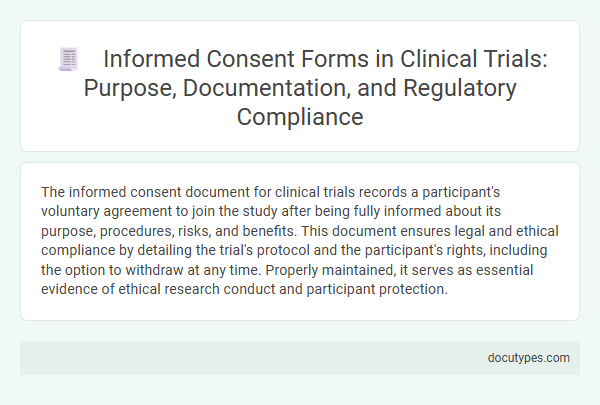The informed consent document for clinical trials records a participant's voluntary agreement to join the study after being fully informed about its purpose, procedures, risks, and benefits. This document ensures legal and ethical compliance by detailing the trial's protocol and the participant's rights, including the option to withdraw at any time. Properly maintained, it serves as essential evidence of ethical research conduct and participant protection.
Introduction to Informed Consent in Clinical Trials
Informed consent in clinical trials is a critical process that ensures your voluntary participation after understanding all relevant information. It is documented to protect your rights and promote ethical standards in medical research.
- Informed Consent Form (ICF) - A comprehensive document that outlines the purpose, procedures, risks, and benefits of the clinical trial for participants.
- Participant Information Sheet - Provides detailed information that supports the informed consent form, helping participants make an educated decision.
- Consent Documentation Records - Official records maintained by the clinical trial sponsor or institution to verify that informed consent was obtained appropriately.
Definition and Importance of Informed Consent Forms
Informed consent forms document the voluntary agreement of participants to join clinical trials after being fully informed about the study's purpose, procedures, risks, and benefits. These forms serve as legal and ethical evidence that participants understand the trial details before participation.
The importance of informed consent forms lies in protecting participants' rights and ensuring transparency throughout the clinical trial process. They uphold ethical standards in medical research by promoting autonomy and preventing coercion or deception.
Key Elements Required in Informed Consent Forms
Informed consent for clinical trials is documented through a formal Informed Consent Form (ICF). This document ensures participants understand the trial's purpose, procedures, risks, and benefits before enrollment.
Key elements required in informed consent forms include a clear explanation of the trial's objectives, detailed description of potential risks and benefits, and participant rights such as the right to withdraw at any time. The form must also outline data confidentiality measures and contact information for questions or emergencies. Ethical guidelines mandate that the information is presented in a language understandable to the participant to facilitate truly informed decisions.
Ethical Principles Guiding Informed Consent
| Document | Description | Ethical Principles Guiding Informed Consent |
|---|---|---|
| Informed Consent Form (ICF) | The primary document used to record a participant's voluntary agreement to join a clinical trial. It includes detailed information about the study's purpose, procedures, risks, benefits, and participant rights. |
|
| Ethics Committee/Institutional Review Board (IRB) Approval Documentation | Records validating that the informed consent process follows ethical standards and regulatory requirements before trial initiation. |
|
| Patient Information Sheet | An informational supplement to the ICF, providing clear, understandable details about the clinical trial for participant consideration. |
|
Regulatory Requirements and Compliance Standards
Informed consent for clinical trials is documented through a detailed consent form that outlines the trial's purpose, procedures, risks, and benefits. Regulatory requirements from agencies such as the FDA, EMA, and ICH-GCP mandate that this document be signed by the participant before enrollment. Compliance standards ensure informed consent is obtained ethically, transparently, and recorded accurately to protect participant rights and maintain trial integrity.
Process of Obtaining Informed Consent from Participants
```htmlWhat document records informed consent for clinical trials? The informed consent form (ICF) is the official document used to record participants' agreement to join a clinical trial. This form details the trial's purpose, procedures, risks, benefits, and participants' rights.
How is the process of obtaining informed consent from participants conducted? The process involves providing clear verbal and written information to potential participants about the clinical trial. Participants must have the opportunity to ask questions and voluntarily sign the informed consent form before enrolling.
```Documentation and Record-Keeping Best Practices
Informed consent for clinical trials is documented through official consent forms that participants sign before enrollment. Proper record-keeping ensures regulatory compliance and participant protection throughout the trial.
- Consent Form Completion - The signed informed consent form serves as the primary legal document recording voluntary participant agreement.
- Secure Storage - All consent documents must be stored securely, either physically or electronically, to maintain confidentiality and prevent unauthorized access.
- Audit Trail Maintenance - Maintaining a detailed log of consent revisions and communications supports transparency and regulatory review.
Challenges and Solutions in Informed Consent Administration
Informed consent documents for clinical trials serve as a critical record ensuring participants understand the study's purpose, risks, and benefits. Challenges in administering informed consent include varying patient literacy levels, language barriers, and ensuring comprehension in complex protocols. Solutions involve using simplified consent forms, multilingual resources, and interactive digital tools to enhance participant understanding and compliance.
Special Considerations for Vulnerable Populations
The informed consent form documents a participant's voluntary agreement to join a clinical trial after understanding the study's purpose, procedures, risks, and benefits. This essential document ensures ethical standards and regulatory compliance in medical research.
Special considerations for vulnerable populations include clear explanations tailored to cognitive abilities and cultural sensitivities to support informed decision-making. Your medical team takes extra care to protect minors, elderly individuals, and those with impaired decision-making capacity during the consent process.
What Document Records Informed Consent for Clinical Trials? Infographic

